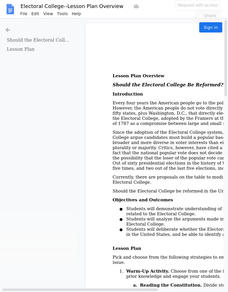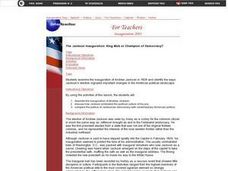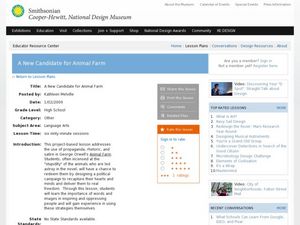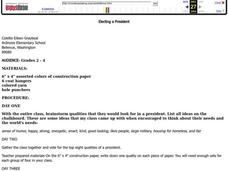iCivics
Mini-Lesson: Gerrymandering
Who determines the structure of voting districts? The concept of gerrymandering brings to light the ongoing issue of how those running for office gain votes. Hands-on activities enable scholars to analyze the re-drawing of voting...
Encyclopedia Britannica
Candidate Book Report
After reading candidate biographies, class members select one candidate to research. They craft a report on the candidate's book, their position on issues, and the image the candidate wants to project.
Encyclopedia Britannica
Presidential Succession
"Who takes over if a president dies, resigns, is impeached, or is otherwise removed from office?" That is the question class members research. After listing the 18 successors in order, individuals respond in writing to a series of...
Encyclopedia Britannica
Do the Campaign Math
Follow the money trail! As part of their study of the 2020 Presidential campaign, class members to research how much money candidates have raise and spent, as well as the sources of the funds. They then graph their findings to compare...
Encyclopedia Britannica
Candidate Flip-Flop or Evolution?
Beware political rhetoric! Connotation is everything! Groups select a presidential candidate and investigate how the candidate's position has changed on a specific issue. After analyzing the situation, the group determines whether they...
Encyclopedia Britannica
Presidential Electability
There are specific constitutional requirements that candidates must meet to become president of the United States. In addition, there are societal opinions that affect a candidate's electability. Class members examine historical...
Encyclopedia Britannica
Meta-Study: Political Brains
Are there differences in the brains of liberals and conservatives? That is the question young political scientists are challenged to answer. Class members examine studies, consider how the results are presented, and how the studies were...
C-SPAN
Electoral College
Most people are surprised to learn that American democracy is not as direct as they thought. Using a package of guiding questions, charts and curated videos, learners unpack the unique American institution of the Electoral College. The...
C-SPAN
Big Data and Politics
Movie selection means more than entertainment. Learners consider what information Netflix gathers to understand the concept of "big data." Resource includes clips of experts talking about corporations that harvest the details of our...
US House of Representatives
“The Fifteenth Amendment in Flesh and Blood,” The Symbolic Generation of Black Americans in Congress, 1870–1887
The reading of a contextual essay launches a study of Black Americans who served in Congress from 1870 through 1887. Young historians identify the African Americans who served during this period, investigate the ways they won national...
Curated OER
Writing a Political Leader
Students peer edit a letter. In this editing lesson, students peer edit a letter written to a political figure by another student. Students discuss edits and revisions needed for improvement. This is a continuation lesson that is part...
Curated OER
Launching Your Ship with Citizenship Lesson 4: Hoisting the Flag
Students discuss the U.S. electoral process and brainstorm solutions to increase voter turnout in their community. In this democratic citizenship lesson, students identify keywords in speech and video related to freedom of speech and...
Curated OER
Presidential Eligibility
Students examine what requirements determine who can and can't run for president.
Curated OER
The Old Electoral College Try
Students examine defining issues in the race for the White House and evaluate important issues in several of the swing states. They create and administer a poll in their community and make predictions by analyzing the data.
Curated OER
Social Studies: Candidate Issue Positions
Learners examine the positions of candidates on various issues. Using visual displays, they describe the platforms and positions of candidates on specific issues. Students include opposing views in their displays from other candidates.
Curated OER
Political Commercials: Leading or Misleading Voters
Students watch election commercials for a homework assignment. They analyze the commercials and create a commercial for a fictitious candidate using the techniques they observed.
Curated OER
The Jackson Inauguration: King Mob or Champion of Democracy?
Students examine and describe Andrew Jackson's 1828 inauguration, identify ways Jackson's election signaled important changes in American political landscape, discuss how Jackson embodied political culture of his era, and compare...
Curated OER
A New Candidate for Animal Farm
Students create an advertising campaign in which a candidate from Animal Farm will run for an upcoming election. In this follow-up activity to George Orwell's Animal Farm lesson, students explore propaganda, rhetoric, and satire as they...
PBS
The Big Picture-Economic Security in the Country and your Community
High schoolers explore economic security at the local and national level during the time period preceding the 2008 presidential election. They fill out surveys on their thoughts and concerns regarding the US economy, and watch a video...
Curated OER
Face the Nation! A Panel Discussion
Sixth graders simulate an election-year debate between opposing political parties. In this persuasive-speech lesson plan, 6th graders will work in teams to prepare for and participate in a debate between opposing parties. The lesson plan...
Curated OER
Electing a president
Young scholars create a list of characteristics of a president and reach consensus about the most important qualities. For this electing a President lesson, students work in groups to choose the most important traits of a president and...
Curated OER
Government is News: Studying the Constitution
Sixth graders explore the United States Constitution. In this social studies instructional activity, learners discover how a bill is made into law, study the election process, and identify specific elements of the Bill of Rights.
Facing History and Ourselves
Confirmation and Other Biases
As the investigation into the reporting of the events in Ferguson, Missouri, continues, class members consider how bias influences perception, how the tendency is to collect evidence that supports preconceived notions. The big idea...
Street Law
The Challenge of Selecting an Ideal Supreme Court Nominee
Nearly every president has had the opportunity to name a nominee to the United States Supreme Court. But what makes someone an ideal candidate to become a Supreme Court justice? High schoolers test their prior knowledge about the Supreme...
Other popular searches
- Election Day
- Presidential Elections
- Election Day for Kids
- 2008 Presidential Election
- Voting and Elections
- Election of 1860
- Election 2008
- 2nd Grade Election Day
- Mock Election
- Election Day Activities K 3
- Abraham Lincoln Election
- 2008 Elections

























